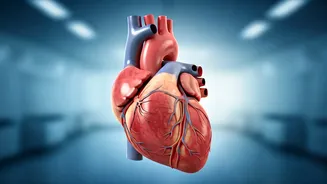Biological Differences
Cardiovascular health disparities between men and women often stem from fundamental biological distinctions. One key factor is the difference in hormones.
Estrogen, a critical hormone in women, offers significant cardiovascular protection. It helps maintain healthy cholesterol levels, reduces the accumulation of plaque in arteries, and has a positive impact on blood vessel function. However, after menopause, when estrogen levels decline, women lose this protective advantage. This makes them more susceptible to heart disease. Furthermore, women's hearts and blood vessels can be structurally and functionally different, affecting how heart disease manifests and progresses. Small vessels might be more prone to damage in women, and the symptoms of heart disease can vary, sometimes leading to delayed diagnosis and treatment. Recognizing and understanding these biological nuances is a vital first step in managing women's heart health effectively.
Lifestyle Factors Impact
Lifestyle choices significantly impact a woman's heart health, with many factors increasing the risk of cardiovascular disease. The cumulative effects of poor lifestyle habits often lead to a greater disease burden for women compared to men. Smoking, for instance, dramatically elevates the risk of heart disease, and the effects can be more pronounced in women than in men. Similarly, poor dietary choices, such as high intake of saturated and trans fats, contribute to increased cholesterol levels and the development of atherosclerosis. Physical inactivity is another major contributor; regular exercise is vital for maintaining a healthy weight, controlling blood pressure, and improving overall cardiovascular function. Chronic stress, which is often more prevalent in women due to various social and occupational pressures, also takes a toll, elevating blood pressure and increasing the likelihood of heart disease. Addressing these lifestyle issues through balanced diets, regular exercise, stress management techniques, and avoiding smoking is essential for women's heart health.
Symptom Presentation Varies
Heart disease symptoms in women often differ from those in men, making early detection more difficult. While chest pain remains a common symptom, women frequently experience atypical symptoms that can be easily misinterpreted. These may include fatigue, nausea, shortness of breath, and pain in the jaw, neck, or back. These symptoms can be subtle or vague, making it easy for women to dismiss them as stress or other less serious conditions. This delayed recognition can lead to a later diagnosis, resulting in poorer outcomes. Moreover, healthcare providers might also be less likely to suspect heart disease in women presenting with atypical symptoms, leading to missed or delayed diagnostic testing. Increased awareness among both women and healthcare professionals of these atypical symptoms is crucial. Ensuring women recognize the less conventional signs of heart disease helps accelerate accurate diagnosis and treatment, ultimately improving survival rates and overall cardiovascular health. Seeking medical attention promptly when experiencing any concerning symptoms is essential.
Preventive Strategies Matter
Preventive measures are vital for safeguarding women's heart health, and early intervention plays a key role in reducing the risk of heart disease. Women should prioritize regular health check-ups and screenings, including blood pressure and cholesterol level checks, to identify potential problems early. Adopting a heart-healthy diet rich in fruits, vegetables, and whole grains is also essential, while limiting saturated and trans fats, sodium, and added sugars. Regular physical activity, such as brisk walking, swimming, or dancing, helps maintain a healthy weight, lowers blood pressure, and boosts overall cardiovascular function. Managing stress through techniques like yoga, meditation, or spending time in nature is also beneficial. Women should be aware of their family history of heart disease and discuss any concerns with their healthcare provider. Educating oneself about heart health and adopting these preventive strategies can empower women to take control of their cardiovascular well-being and live longer, healthier lives.





















